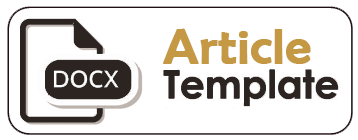Plagiarism Check
Academy of Social Science and Global Citizenship Journal state that plagiarism is not acceptable for all author and therefore establishes the following policy stating specific actions (penalties) when plagiarism is identified by plagiarism cheker software in an article that is submitted for publication. We are using Turnitin as the plagiarism checker software.
“Plagiarism is copying another person’s text or ideas and passing the copied material as your own work. You must both delineate (i.e., separate and identify) the copied text from your text and give credit to (i.e., cite the source) the source of the copied text to avoid accusations of plagiarism. Plagiarism is considered fraud and has potentially harsh consequences including loss of job, loss of reputation, and the assignation of reduced or failing grade in a course."
This definition of plagiarism applies for copied text and ideas:
- Regardless of the source of the copied text or idea.
- Regardless of whether the author(s) of the text or idea which you have copied actually copied that text or idea from another source.
- Regardless of whether or not the authorship of the text or idea which you copy is known
- Regardless of the nature of your text (journal paper/article, web page, book chapter, paper submitted for a college course, etc) into which you copy the text or idea
- Regardless of whether or not the author of the source of the copied material gives permission for the material to be copied; and
- Regardless of whether you are or are not the author of the source of the copied text or idea (self-plagiarism).
When plagiarism is identified by the Plagiarism Checker software, the Editorial Board responsible for the review of this paper and will agree on measures according to the extent of plagiarism detected in the article in agreement with the following guidelines:
Minor Plagiarism
A small sentence or short paragraph of another manuscript is plagiarized without any significant data or idea taken from the other papers or publications.
Punishment: A warning is given to the authors and a request to change the manuscript and properly cite the original sources.
Intermediate Plagiarism
A significant data, paragraph, or sentence of an article is plagiarized without proper citation to the original source.
Punishment: The submitted article is automatic rejected.
Severe Plagiarism
A large portion of an article is plagiarized that involves many aspects such as reproducing original results (data, formulation, equation, law, statement, etc.), ideas, and methods presented in other publications.
Punishment: The paper is automatic rejected and the authors are forbidden to submit further articles to the journal.
Retraction
The articles published in Academy of Education Journal will be considered to retract in the publication if:
- they have clear evidence that the findings are unreliable, either as a result of misconduct (e.g. data fabrication) or honest error (e.g. miscalculation or experimental error)
- the findings have previously been published elsewhere without proper crossreferencing, permission or justification (i.e. cases of redundant publication)
- it constitutes plagiarism
- it reports unethical research
The mechanism of retraction follow the Retraction Guidelines of Committee on Publication Ethics (COPE) which can be accessed at https://publicationethics.org/files/retraction%20guidelines.pdf





